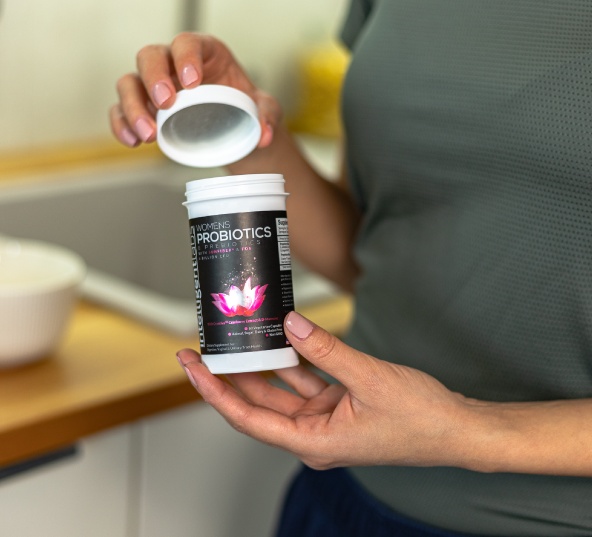Choosing feminine probiotics over regular probiotics is important for women. You might ask, “Aren’t all probiotics similar?” Not quite. As you’ll see below, a product specifically designed for women, like our Women’s Probiotics & Prebiotics, may boost feminine health in ways that generic probiotics might not.
Table of Contents
What’s so special about feminine probiotics? How do they help women?
So, let’s start with the basics: probiotics are good bacteria that contribute to many aspects of our health, including gut and immune health, and yes, also feminine health.
In our Ultimate Guide To Probiotics, we shared more than 20 probiotic-associated health benefits. But in this blog post, we’ll focus on the women-specific benefits. Here are some of them:
1) Women’s probiotics may support vaginal health
The key to vaginal health is maintaining a balance of microorganisms (both good and bad) in the vagina. The predominant beneficial bacteria is called Lactobacillus.
Lactobacilli increase lactic acid levels and make the vaginal environment more acidic. This acidity is a natural defense, deterring harmful bacteria and enhancing protection against infections, thereby bolstering vaginal health.1
Our Women’s Probiotics contain a blend of Lactobacillus and Bifidobacterium strains that may help maintain this balance, reducing the risk of yeast infections and bacterial vaginosis.
2) Feminine probiotics may prevent urinary tract infections
Urinary tract infections (UTIs) range from being a minor annoyance to causing severe pain. These infections develop when bacteria grow in the urinary tract, leading to inflammation.

Women are more susceptible to UTIs than men due to their shorter urethra. Estimates suggest about 50% of women will experience a UTI at some point, and up to 23.9% of pregnant women get an infection.2
The good news is that women’s probiotics may offer a preventive solution by warding off harmful bacteria. One study found that taking probiotics for UTI may help prevent the infection from coming back. 3
While antibiotics are a standard treatment, they eliminate both beneficial and harmful bacteria, which can lead to issues like antibiotic resistance if not taken as prescribed. This resistance can make future infections harder to treat.
However, probiotics target only harmful bacteria and have been shown not to contribute to antibiotic resistance, offering a promising alternative for managing UTIs.4
For even better UTI action, we’ve enriched our Women’s Probiotics with Cranberry and D-Mannose powders. Both ingredients are known for their potential to prevent urinary tract infections (UTIs).
Cranberry powder helps flush out harmful microorganisms from the urinary tract by preventing bacteria from adhering to the lining, thus reducing UTI risk. 5 6 Meanwhile, D-mannose is a promising antibiotic alternative, potentially clearing the bacteria that cause UTIs and preventing their recurrence.7 8
3) Women’s probiotics may help with hormone balance and bone health
Lower estrogen levels after menopause lead to postmenopausal osteoporosis (PMO), resulting in weakened bones and a higher risk of fractures for women.9
Traditional treatments for PMO carry substantial side effects, including an increased risk of cancer. Fortunately, probiotics may be a safer alternative.
Recent studies linking gut health to bone strength have shown that probiotics can help balance hormones that affect bone health in postmenopausal women. 10 11
4) Probiotics may help women maintain a healthy weight
Research suggests that probiotics could be beneficial for women’s weight management and metabolic health.
Specific strains of Lactobacillus and Bifidobacterium have been shown to reduce body weight, BMI, and fat mass by altering gut microbiota composition. These effects are strain-specific and appear to vary between genders, often offering more substantial benefits to women.12 13
Moreover, adding probiotics to a weight loss diet led to more significant improvements in heart health than just dieting alone.14
5) Probiotics for women may help manage PCOS symptoms
Polycystic ovary syndrome (PCOS) affects many women of reproductive age, and its symptoms can be exacerbated by being overweight. However, taking probiotics for weight loss, alongside a healthy lifestyle, could offer benefits.
Research by Calcaterra et al. suggests a link between PCOS, obesity, and gut bacteria imbalance, particularly in teenage girls. Their findings indicate that probiotics could aid in balancing hormones, reducing inflammation, and boosting metabolism in teens with PCOS.
Participants who took probiotics experienced better weight, blood sugar levels, and body mass index (BMI). Although further studies are necessary, probiotics are a promising PCOS supplement for managing this condition in overweight individuals.15
6) Female probiotics may even help slow cervical cancer
Cervical cancer is the fourth most common cancer among women worldwide. Early detection and vaccination are cost-effective ways to prevent it. If caught early and treated promptly, cervical cancer can also be cured. 16
Interestingly, there’s a 2022 study that highlights the potential of a healthy vaginal microbiome to slow the progression of cervical cancer.
So, as mentioned in point #1, probiotics contribute to a healthy vagina. They help strengthen the vaginal mucosal barrier and limit the attachment of harmful flora to the barrier. This amplifies the immune system’s capacity to combat threats in the vagina, including directly attacking cancer cells.
But that’s not all! The same study also reported that probiotics may reduce the side effects of radiotherapy. This makes probiotics a promising supplementary strategy in cervical cancer management. 17
So, what is the best probiotic supplement for women?
Now, what makes the Intelligent Labs Women’s Probiotics & Prebiotics stand out? Well, our formula isn’t just any probiotic blend; it’s specifically tailored to meet the unique health needs of women.

Our product features 4 patented probiotic strains selected for their positive impact on women’s health, ensuring you receive targeted support. These strains are L. acidophilus La-14®, B. lactis Bl-04®, B. bifidum Bb-06®, and B. longum Bl-05®.
Like our other Probiotics & Prebiotics supplements, we’ve also included two types of prebiotics (Sunfiber® and FOS) in our feminine probiotics. The prebiotics (aka fiber) nourish these probiotics, enhancing their effectiveness in your gut.
And, as mentioned in benefit #2, our formula also includes a healthy dose of Cranberry powder and D-mannose powder for additional feminine support!
Related article: How To Choose The Best Probiotics For Women?
Conclusion
Taking a feminine probiotic like our Women’s Probiotics & Prebiotics is a small change that can make a big difference in your health. Whether it’s supporting your vaginal health, helping prevent those pesky UTIs, or just giving your gut that extra bit of love, our probiotic blend is designed with your well-being in mind!
💬 Something on your mind? Share your thoughts in the comments. We love hearing from curious minds.
📩 And while you’re here, join our newsletter for more smart stuff (and secret perks)!
References:
- O’Hanlon, Deirdre E., et al. “Vaginal PH and Microbicidal Lactic Acid When Lactobacilli Dominate the Microbiota.” PLoS ONE, vol. 8, no. 11, 6 Nov. 2013, p. e80074, www.ncbi.nlm.nih.gov/pmc/articles/PMC3819307/ ↩︎
- Nahid Ebadi Salari, et al. “Global Prevalence of Urinary Tract Infection in Pregnant Mothers: A Systematic Review and Meta-Analysis.” Public Health, vol. 224, 1 Nov. 2023, pp. 58–65, https://doi.org/10.1016/j.puhe.2023.08.016. ↩︎
- Amanda Chan. “Probiotics Could Help Prevent Urinary Tract Infections.” Livescience.com, 15 Apr. 2011, www.livescience.com/13747-good-bacteria-prevent-urinary-tract-infection.html. ↩︎
- Beerepoot, Mari[[euml]]lle A. J. “Lactobacilli vs Antibiotics to Prevent Urinary Tract Infections.” Archives of Internal Medicine, vol. 172, no. 9, 14 May 2012, p. 704, https://doi.org/10.1001/archinternmed.2012.777. ↩︎
- González de Llano, Dolores, et al. “Cranberry Polyphenols and Prevention against Urinary Tract Infections: Relevant Considerations.” Molecules, vol. 25, no. 15, 1 Aug. 2020, p. 3523, https://doi.org/10.3390/molecules25153523. ↩︎
- Shin, Cha-Nam. “The Effects of Cranberries on Preventing Urinary Tract Infections.” Clinical Nursing Research, vol. 23, no. 1, 8 Feb. 2013, pp. 54–79, https://doi.org/10.1177/1054773813475448. ↩︎
- Wagenlehner, Florian, et al. “Why D-Mannose May Be as Efficient as Antibiotics in the Treatment of Acute Uncomplicated Lower Urinary Tract Infections—Preliminary Considerations and Conclusions from a Non-Interventional Study.” Antibiotics, vol. 11, no. 3, 25 Feb. 2022, p. 314, https://doi.org/10.3390/antibiotics11030314. ↩︎
- Kranjčec, Bojana, et al. “D-Mannose Powder for Prophylaxis of Recurrent Urinary Tract Infections in Women: A Randomized Clinical Trial.” World Journal of Urology, vol. 32, no. 1, 2014, pp. 79–84, https://doi.org/10.1007/s00345-013-1091-6. ↩︎
- Eastell, Richard, et al. “Postmenopausal Osteoporosis.” Nature Reviews Disease Primers, vol. 2, no. 1, 29 Sept. 2016, https://doi.org/10.1038/nrdp.2016.69 ↩︎
- Huidrom, Sangeeta, et al. “Post-Menopausal Osteoporosis and Probiotics.” Current Drug Targets, vol. 21, 27 Oct. 2020, https://doi.org/10.2174/1389450121666201027124947. ↩︎
- Britton, Robert A., et al. “ProbioticL. ReuteriTreatment Prevents Bone Loss in a Menopausal Ovariectomized Mouse Model.” Journal of Cellular Physiology, vol. 229, no. 11, 29 July 2014, pp. 1822–1830, https://doi.org/10.1002/jcp.24636. ↩︎
- Sanchez, Marina, et al. “Effect of Lactobacillus Rhamnosus CGMCC1.3724 Supplementation on Weight Loss and Maintenance in Obese Men and Women.” British Journal of Nutrition, vol. 111, no. 8, 3 Dec. 2013, pp. 1507–1519, https://doi.org/10.1017/s0007114513003875 ↩︎
- Kadooka, Y, et al. “Regulation of Abdominal Adiposity by Probiotics (Lactobacillus Gasseri SBT2055) in Adults with Obese Tendencies in a Randomized Controlled Trial.” European Journal of Clinical Nutrition, vol. 64, no. 6, 10 Mar. 2010, pp. 636–643, https://doi.org/10.1038/ejcn.2010.19. ↩︎
- Moludi, Jalal, et al. “Interactive Effect of Probiotics Supplementation and Weight Loss Diet on Metabolic Syndrome Features in Patients with Coronary Artery Diseases: A Double-Blind, Placebo-Controlled, Randomized Clinical Trial.” American Journal of Lifestyle Medicine, 3 May 2019, p. 155982761984383, https://doi.org/10.1177/1559827619843833. ↩︎
- Calcaterra, Valeria, et al. “Probiotics and Polycystic Ovary Syndrome: A Perspective for Management in Adolescents with Obesity.” Nutrients, vol. 15, no. 14, 14 July 2023, pp. 3144–3144, https://doi.org/10.3390/nu15143144. ↩︎
- World Health Organization. “Cervical Cancer.” World Health Organization, World Health Organization, 17 Nov. 2023, www.who.int/news-room/fact-sheets/detail/cervical-cancer. ↩︎
- Mei, Zhaojun, and Dandan Li. “The Role of Probiotics in Vaginal Health.” Frontiers in Cellular and Infection Microbiology, vol. 12, 28 July 2022, https://doi.org/10.3389/fcimb.2022.963868. ↩︎




